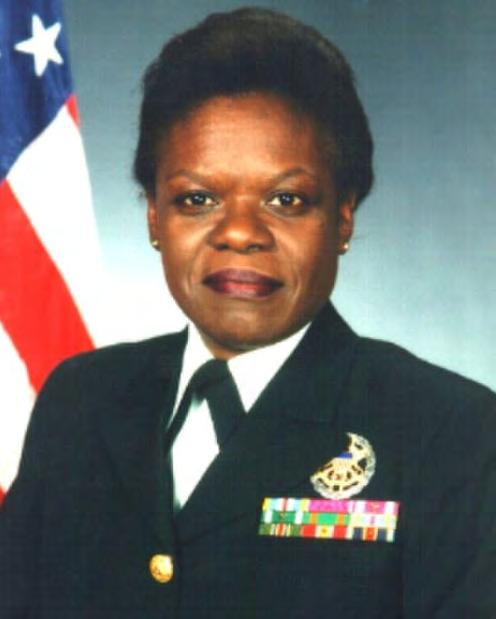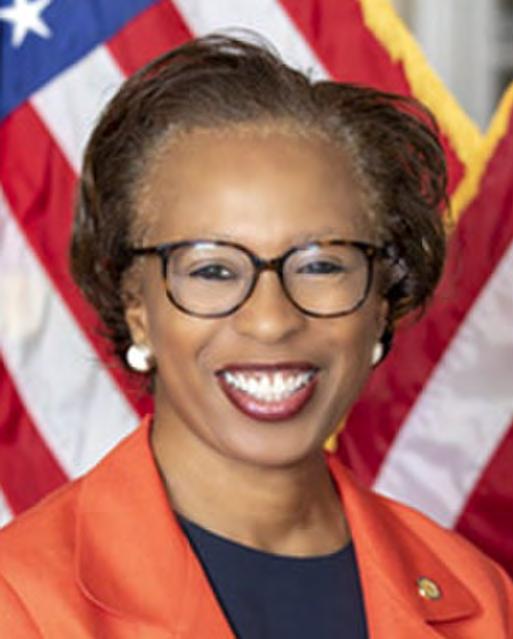
3 minute read
Month Inspirational Women
Lillian Fishburne
America’s First Black Female Rear Admiral (b. 1949)

Lillian E. Fishburne was seemingly destined for military service, being born into a naval family in Patuxent River in Maryland. Her father, who served as an active duty navy sailor, has spoken highly of his daughter’s determination, stating that she never doubted her military dreams, regardless of her identity and gender. Early on in her career Fishburne demonstrated an unyielding drive, as she served as the personnel and legal officer at the Naval Air Test Facility located in Lakehurst, New Jersey. She quickly rose up the ranks, demonstrating an eagerness to learn, and a natural talent for leadership. She was commissioned an ensign in 1973. On February 1, 1998, Fishburne went on to become the 19th African
Ava DuVernay
A Natural Film Talent (b. 1972)
Ava DuVernay was 32 when she first picked up a camera, yet she has achieved many “firsts” as an African American female in the film industry: several Emmy nominations, a Best Director Golden Globe nomination, a Best Picture Oscar nomination, and director of a Hollywood film with a $100 million-plus budget. The Compton, CA native embraced her creative side in 2006 with the release of her first short film in 2006, Saturday Night Life, based on her mother’s life experiences. Her documentary, Compton in C Minor, soon followed and, in 2012, Middle of Nowhere, won her Best Director at the world-renowned Sundance Film Festival, a first for an African American woman of color.
American rear admiral, simultaneously making her the first Black female rear admiral in U.S. history, receiving her promotion from President Bill Clinton. Before retiring in February 2001, Fishburne was assigned as the Director of the Information Transfer Division for the Space, Information Warfare, Command and Control Directorate, Chief of Naval Operations, Washington, D.C.
heryl l Johnson
America’s Clerk of the U.S. House of Representatives (b. 1960)
New Orleans-born Cheryl L. Johnson is the 36th person who has served as Clerk of the U.S. House of Representatives. She previously served during the 116th, and was sworn in for the 117th Congress by Speaker Nancy Pelosi on January 3, 2021. She is currently serving as part of 118th Congress, serving as Clerk of the U.S. House of Representatives. Before serving as Clerk, Johnson worked diligently in the House for almost 20 years, and additional 10 years at the Smithsonian Institution where she worked as the Director of the Smithsonian Office of Government Relations, building and sustaining relations with Congress. Johnson also has served on Capitol

imberlé Williams
Renshaw
The Woman Behind Critical Race Theory (b. 1959)

Ohio native Kimberlé Williams
Hills as the Chief Education and Investigative Counsel for the House Committee on Education and the Workforce. She earned her bachelor’s degree in journalism and mass communication from the University of Iowa and her law degree from Howard University.
Joycelyn Elders
Joycelyn Elders was the first African American and the second woman to become U.S. Surgeon General. In 1993, Governor Bill Clinton appointed Dr. Elders as head of the Arkansas Department of Health where she held that position from 1987-1992.

DuVernay’s critically acclaimed work to date, among them: I Will Follow, Selma, 13th, Queen Sugar, A Wrinkle in Time, and When They See Us is just the beginning for this powerhouse talent who is bringing socially conscious filmmaking to millions of television and movie audiences.

Crenshaw is a graduate of Cornell University, Harvard University, and the University of Wisconsin and has spent more than 30 years studying Black feminist legal theory, race, gender, and racism in the law and is an advocate for measures and practices that promote an egalitarian and just society. She currently teaches at Columbia University, and also at UCLA where she became a founder and leader of the movement called Critical Race Theory (CRT). CRT is a legal concept that argues that social and legal structures are inherently racist and explores how race works within such structures. In 1989, Crenshaw coined the legal term “intersectionality”, arguing that racial and sexual discrimination overlap, subjecting
Black women to both racial and gender discrimination, and often the combination of the two. In other words, Black women, as a group, face unique and specific challenges depending on how they are viewed, understood, and treated in society and within the law. Scholars all over the world have taken to Crenshaw’s theories. Her lectures on race and similar topics have been debated and taught in the U.S. and parts of Asia, Africa, Europe, and South America.










